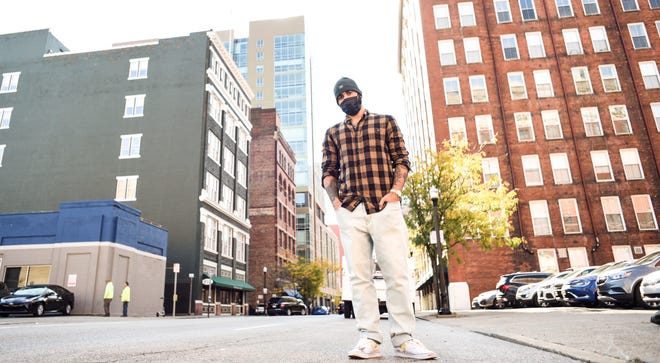

Army veteran and photographer Isaac Wright will be enrolled in a treatment program in lieu of conviction settling the six felony charges against him in Hamilton County.
Hamilton County Common Pleas Judge Lisa Allen accepted a plea deal Thursday. Wright will undertake therapy as recommended by a probation officer, who is also a military veteran, for around two years and check in monthly with the judge.
Allen also barred Wright from Great American Ball Park and Great American Tower at Queen City Square. Wright also agreed to pay $5,500 in restitution.
"You're a smart kid," Allen told Wright in court. "You're very talented."
The judge said she wants Wright to get his life back in order and comply with the treatment plan so he can continue to produce "beautiful art."
If Wright successfully completes the program, he will not be convicted on any of the charges he faces. If he fails to complete the program, he could be sentenced to seven years in prison.
It has been nearly a year since Wright, 26, was accused of unlawfully entering Great American Tower at Queen City Square to take pictures from the roof prompting a large police response to the building – a response he evaded.
After the incident in Cincinnati, Detective Jeff Ruberg had linked the incident to Wright's Instagram account and other social media, branded driftershoots, which include daring photos from the tops of skyscrapers and bridges across the country.

The Colerain High School graduate took up photography after a stint as an assistant chaplain at a Louisiana military base. In 2018, at the age of 23, he was maintaining a suicide watch list and was trying to help his fellow soldiers find solace. But he still lost people, his friends.
By the end of that year, he was in therapy and had started taking photos.
"There was something about being above the city that calmed the storm in my head, it was the only thing that helped," Wright said. "Photography and exploring became my therapy."
He was honorably discharged from the Army the next year after about six years of service.
Then in December 2020, police were tracking Wright's phone as he traveled across the country. Ruberg said he was evading law enforcement in multiple jurisdictions. Wright told The Enquirer he was just traveling to Las Vegas for a photography job and making a road trip of it.
In the Arizona desert on Dec. 17, he and the person he was traveling with saw traffic was stopped on the highway ahead of them. A law enforcement helicopter circled overhead.
Wright said he felt ill that day and was laying back in his seat getting some rest. Police said he was trying to avoid being spotted.
In an instant, the car was surrounded.
"Five to 10 officers approached my vehicle with handguns and assault rifles pointed at me. I was completely unarmed," Wright said. "Yelling at me to get on the ground, lay down on the ground."
Wright believes the aggressive arrest was due to the fact that the Arizona authorities were unaware of why he was charged.
He said Arizona police were only informed he was a potentially armed and dangerous military veteran with special operations training and a history of post-traumatic stress disorder. He said he has been diagnosed with PTSD but has never had a violent episode.
Wright's story got national attention when the New York Times wrote about the troubling intersection between military veterans and law enforcement and the potential discrimination that comes with special training and especially a post-traumatic stress disorder diagnosis.
Wright would spend the next 100 days in jail fighting to get released on bond.
Ruberg said Wright would disappear and never show up for court if he were released.
"Stealth and deception are his trademarks," Assistant Prosecutor Anne Flanagan said in court. "We don't know what other motive he may have ... but we do know what training he has."
At one point, his bond was temporarily set to $400,000.
When he was released with a GPS ankle monitor, Wright was permitted to travel to Louisiana to report on charges he faced there. As he returned, Wright was pulled over and arrested again on misdemeanor charges out of Northern Kentucky. He said officers told him this arrest was requested by Cincinnati police. Despite having his car impounded, Wright made it back from Bowling Green, Kentucky to Hamilton County in time for his next hearing.
He was arrested a third time in Colerain Township when officers swarmed his father's home after charges were levied against him in Philadelphia. His lawyer, Laurence Haas, said he felt like these repeated arrests amounted to excessive force.
Throughout the case, Cincinnati police have said Wright's offenses are more serious than just taking pictures. They also said they did not lead the arrest operations in any of the jurisdictions.
Captain Doug Weisman, who supervises Ruberg, previously told The Enquirer that Wright has caused tens of thousands of dollars in damage and has stolen items.
"His pictures are amazing. It's just what it takes to get to that," Weisman said. "He's putting people at risk. It's not safe. He needs to stop."
Weisman said several people have died doing what Wright does. Other notable "rooftoppers" have died falling from buildings.
"What he's doing is extremely dangerous," Weisman said. "Although he's probably an expert climber and he's proven that, people that are following him aren't."
After securing Wright's video camera, Cincinnati police said they had been in contact with dozens of police agencies across the country about offenses in other jurisdictions. In February, Ruberg said he expected many to file charges against him. To date, charges were filed in Michigan, Louisiana, Philadelphia and Kentucky. The charges in Michigan and Philadelphia have been dropped. The other cases are still ongoing.

Isaac's lawyers said the solution here in Hamilton County could be adopted as a resolution in other jurisdictions.
Prosecutors said part of the plea agreement bars Wright from selling or posting photos from Great American Tower. When asked, Wright told Judge Allen he had a problem with this arrangement, but after some back and forth with Wright's lawyers, Wright agreed to not sell or post anything during his treatment period.
Wright's career has rapidly grown in the past year. A digital billboard bearing his work is currently on display above Times Square in New York City as part of the NFT Magazine Crypto Art Fair.
Wright said he has sold $6 million in art through NFTs (non-fungible tokens) as cryptocurrency-related art trading has taken off. He told The Enquirer his strong mindset and determination through this court case have allowed him to keep striving to build his career.
"Eight months after being discharged from the military that he honorably served in for six years, Isaac was incarcerated for over 140 days," Haas said in a statement Thursday. "Isaac is looking forward to putting these episodes behind him and healing."
Haas said he's thankful to Judge Allen for allowing Wright to participate in the intervention in lieu of conviction program which will result in no criminal record for Wright.








